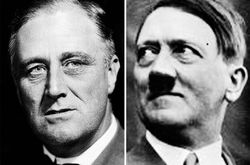
To me, it’s the point where directions turn that are key. To others, it’s the point at which that turn seeks validation, when it’s challenged, that matters.
So to me 1968 matters more than 1976, and 1932 more than 1940. I think 1896 was a key year for America, and that 1860 was probably the key moment in our entire history.
But others just see directions set in those years. The real crisis, in their view, comes after, when the new assumptions are challenged and things turn really violent. World War II is on The History Channel a lot more than the Great Depression is.

Economics always drives the American political train. The North won the Civil War because machines were better than people at doing work, and Republican progressives dominated because the great machines of industry required organization. Democrats dominated for a generation because demand had to balance supply, and Republicans took power back as resources, not machines, came to define economic power.
What happened in 2008, and since, is that technology has taken over. Clouds and devices are replacing markets, not just labor but the whole process by which demand meets supply. The result has been enormous gains in productivity, greater efficiency in the use of resources, and the creation of a new resource called the Internet, whose power has only begun to be tapped. The Internet now drives our economy, and it will drive our politics going forward.

Second, I missed a key point about what the Nixon era taught Americans, which is cynicism. For a generation young Americans have been taught to distrust government. Today’s young people, including those in my own home, distrust government innately. They see it as they have been taught to see it, as a dirty business, as crooked, as rigged by dark forces, as something to avoid.
This is not what Obama-ism was about. Hope is not a plan. It’s an assumption that people will step up and turn hope into reality. Frankly, not enough people in my kids’ generation have done that yet. They haven’t even gotten into the habit of voting. They’re disengaged from politics and the political process and so, on a state level at least, they’re regularly screwed by it. Their passivity in the face of this is disturbing.
What happens in cases like this is that young people are forced to become engaged. Next year, we get to play the 1940 Game.
There are wars taking place on our planet, important wars, history-defining wars, and those seeking to overthrow the Obama Thesis have no damned Clue what they’re all about. They think these are wars of religion, or wars of ideology. They think they’re a threat to America.

What young people, what the American people, have to decide next year is what kind of war we’re fighting, and how it must be won. Conservatives call it a war of ideas, even while fighting it as a war over resources. The current President defines it as a war of strategy, while the nation’s attention is focused on tactics.
It’s the Internet that is the key. We have heard very clearly from Republicans that they see the Internet as a resource, something we can turn off, something we should control. If it doesn’t do our bidding, then it must be taken over in the name of “Freedom,” by which they mean America’s national interest.
That’s a recipe for disaster. What makes the Internet work isn’t interconnection. It’s interaction. Take away the interaction, destroy the ability of the Internet to let people interact across borders, and you render it useless. A useless Internet is very much in the interests of the oil powers. It lets everything be seen as a clash between nations, and since ours is the strongest nation, they assume, we’ll “win.”
But there is no win here.

The battlefield of 2016 is not in Syria. It’s not in San Bernardino. It’s on the screen in front of you, and what lies behind that screen.
Because this is the battlefield, tech companies must enter the political arena. Companies like Facebook and Google, like Microsoft and Apple, are now being directly threatened by what those opposed to the Obama thesis, which you’ll remember came about because of technology, are proposing.
I think it’s likely that the Las Vegas Debate will prove to be as much a turning point in the coming election as Obama’s Google Hangout was for the 2008 election. Because in making their opposition to the Internet clear, by making completely clear that they intend to bend it to the national will, twist it to their political ends, with no understanding of the consequences, Republicans are sealing their political doom.
But we’ll see. Merry Christmas.










